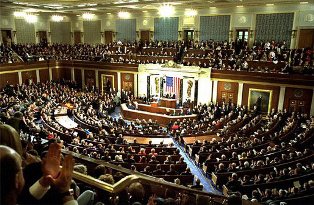 WASHINGTON (AP) -- The supercommittee's failure reflects the nation's divide: Americans crave both the Republicans' demand for low taxes and the Democrats' insistence on protecting social programs. So far, no group or leader has persuaded them they can't have both and there's no quick solution in sight.
WASHINGTON (AP) -- The supercommittee's failure reflects the nation's divide: Americans crave both the Republicans' demand for low taxes and the Democrats' insistence on protecting social programs. So far, no group or leader has persuaded them they can't have both and there's no quick solution in sight.
It's possible the stalemate won't be broken by the time of the 2012 elections, nearly a year away. Some GOP strategists think Republicans can oust President Barack Obama and win control of both chambers of Congress. That would enable them to enact much of their agenda, and Americans could render a judgment on its results.
Or, perhaps, Democrats will score big victories that will force Republicans to yield some ground.
The bipartisan supercommittee's collapse stems from an all-too-familiar reality of modern politics. Republican lawmakers respond to activists who overwhelmingly oppose higher taxes. And Democrats answer to activists who will tolerate no nicks in Medicare, Social Security and other programs without steeper taxes on the wealthy.
The same differences pushed the nation to the brink of default last summer, prompting the first-ever downgrade of the government's creditworthiness.
Yet no leader or group has convinced enough Americans that everyone must accept some pain to bring taxes and government services more closely in line. So the federal debt hit $15 trillion last week. And the government suffered another embarrassment Monday, immediately spooking U.S. markets and possibly unsettling foreign markets in the days ahead.
Nineteenth Century Americans venerated Henry Clay as "the Great Compromiser" for helping resolve knotty national problems. Today, that title would almost surely be hurled as an insult, especially at a rally or caucus to nominate someone for Congress.
The supercommittee's six Democrats and six Republicans knew they would be criticized for failing to reach an accord. But they saw a worse fate in straying too far from their respective parties' uncompromising stands on taxes and social programs.
Many veteran politicians expect more versions of recent elections, which were heavily influenced by partisan activists who put a scare into lawmakers threatening to veer from party orthodoxy.
"Compromise is not where the incentives are in the political process right now," said former Rep. Tom Davis of Virginia, who once headed the GOP's House campaign committee. Because so many House districts are solidly Republican or solidly Democratic, he said, "members are judged by what their primary electorate thinks of them."
Eventually, Davis said, repeated failures to tame the deficit might inflict so much pain on Americans -- possibly through a severe recession or even depression -- that today's primary-dominated voting patterns will change.
Some lawmakers doubtlessly see this coming, Davis said. "But the incentives in the system do not reward you for being ahead of the curve."
Congress reflects the public divide over tax and spending priorities. A new Quinnipiac poll found that 73 percent of Republicans want to address the deficit with spending cuts only, while only a third of Democrats hold that view.
More than half of Democrats favor a mix of tax hikes and spending cuts. Only one Republican in five agrees.
Independent voters, as usual, occupy a middle ground. Slightly more independents favor a spending-cuts-only approach to a strategy that includes some new taxes. But neither option hit 50 percent in the poll.
In 2006, independent voters broke heavily for Democrats, helping that party regain the House majority. In 2008, independents again favored Democrats for Congress, and they helped elect Obama.
But last year, independent voters swung strongly to Republicans, who regained control of the House. Strategists in both parties are angling for independents' support next year.
One possible way to break Washington's cycle of logjams is for independent voters to increase in number and to insist on systemic changes in practices such as congressional redistricting and Senate filibuster powers.
Nathan Daschle, who heads a political networking firm called Ruck.Us, and whose father was a Democratic Senate leader, said the only way he can envision "really changing the incentives of our political system" is to have huge numbers of Republican and Democratic voters switch their affiliation to independent.
William Galston, a Brookings Institution scholar who worked in Bill Clinton's White House, sees two possible turning points before the 2012 elections. Pro-military lawmakers from both parties might succeed where the supercommittee failed, he said, by crafting a tax-and-spending compromise that would avert the cuts scheduled at the Defense Department.
Or, Galston said, Europe's financial problems and the United States' political gridlock might lead to so much economic damage that even devout liberals and solid conservatives will have to rethink their intransigence.
"If people decide there's no difference between the United States and the Eurozone," Galston said, "we may discover the hit we took in global esteem in the summer was just the beginning of the decline."
Peter G. Peterson, a former Commerce secretary and leading critic of deficit spending, said in a statement Monday: "Meaningful deficit reduction requires both parties to vote for a plan that does not reflect their partisan litmus tests."
For now, many lawmakers see that idea as a one-way ticket out of Congress in their next primary elections. Such thinking points to more gridlock ahead.
---
EDITOR'S NOTE - Charles Babington covers politics for The Associated Press.
© 2011 The Associated Press. All rights reserved. This material may not be published, broadcast, rewritten or redistributed. Learn more about our Privacy Policy and Terms of Use.
- Home
- News
- Opinion
- Entertainment
- Classified
- About Us
 MLK Breakfast
MLK Breakfast- Community
- Foundation
- Obituaries
- Donate
04-20-2024 9:29 am • PDX and SEA Weather






















































































































































































































































































































